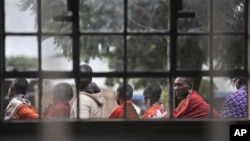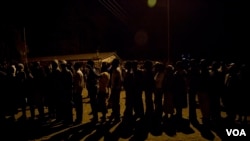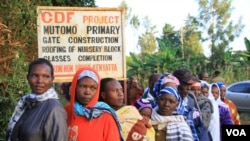NAIROBI —
Kenyans are standing in long lines to elect the country’s fourth president since independence. Voting has been mostly peaceful, so far, although there are reports of violence in the country’s coastal region.
Voters were patiently waiting in blocks-long lines for the polls to open this morning in Kibera, a Nairobi slum. They are among the more than 14 million people registered to vote in today’s national and local elections.
Bernard Onyango was at the front of the line at his polling station. He arrived at midnight so he could be one of the first to vote.
“We just wait patiently, because we don’t have another day," he said. "This is the only day.”
Voters will decide a hotly contested presidential contest. Surveys showed Prime Minister Raila Odinga and Deputy Prime Minister Uhuru Kenyatta locked in a tight race, ahead of six other candidates.
In the run-up to the election, candidates and public officials had called on Kenyans to maintain peace regardless of the outcome. But there are already reports of scattered violence. More than a dozen people - including several police officers - were killed in an early morning attack in a Kenyan coast town.
Related - Kenyans Vote Amid Threats of Violence
More than 1,000 people died in post-election violence following Kenya’s last presidential election, in 2007.
At Kibera Primary School, where Odinga voted, the atmosphere was calm. After casting his ballot, Odinga predicted he would win.
“Never before have Kenyans turned up in such large numbers to exercise their democratic right… They’re going to vote for change in these elections,” he said.
Odinga told the crowd this morning that if he does lose, he is willing to concede.
After casting his ballot in Gatundu, Kenyatta told supporters not to be discouraged by reports of violence or faulty biometric voter registration kits. The kits use fingerprints and facial features to identify voters. They are being used for the first time in Kenya for this election.
Asia Suleiman, an observer with the Independent Electoral and Boundaries Commission, says the kits are slowing the voting process.
“Even the time we are taking to vote, it’s a bit longer. It’s not easier. But the good thing is that I think there is a bit of credibility in it,” said Suleiman.
Voting is set to close at five this evening, but the election commission promised it would be extended as needed to accommodate everyone who was in line to vote by that time .
If no candidate emerges with a majority, the top two finishers will compete in a run-off in April.
Voters were patiently waiting in blocks-long lines for the polls to open this morning in Kibera, a Nairobi slum. They are among the more than 14 million people registered to vote in today’s national and local elections.
Bernard Onyango was at the front of the line at his polling station. He arrived at midnight so he could be one of the first to vote.
“We just wait patiently, because we don’t have another day," he said. "This is the only day.”
Voters will decide a hotly contested presidential contest. Surveys showed Prime Minister Raila Odinga and Deputy Prime Minister Uhuru Kenyatta locked in a tight race, ahead of six other candidates.
In the run-up to the election, candidates and public officials had called on Kenyans to maintain peace regardless of the outcome. But there are already reports of scattered violence. More than a dozen people - including several police officers - were killed in an early morning attack in a Kenyan coast town.
Related - Kenyans Vote Amid Threats of Violence
More than 1,000 people died in post-election violence following Kenya’s last presidential election, in 2007.
At Kibera Primary School, where Odinga voted, the atmosphere was calm. After casting his ballot, Odinga predicted he would win.
“Never before have Kenyans turned up in such large numbers to exercise their democratic right… They’re going to vote for change in these elections,” he said.
Odinga told the crowd this morning that if he does lose, he is willing to concede.
After casting his ballot in Gatundu, Kenyatta told supporters not to be discouraged by reports of violence or faulty biometric voter registration kits. The kits use fingerprints and facial features to identify voters. They are being used for the first time in Kenya for this election.
Asia Suleiman, an observer with the Independent Electoral and Boundaries Commission, says the kits are slowing the voting process.
“Even the time we are taking to vote, it’s a bit longer. It’s not easier. But the good thing is that I think there is a bit of credibility in it,” said Suleiman.
Voting is set to close at five this evening, but the election commission promised it would be extended as needed to accommodate everyone who was in line to vote by that time .
If no candidate emerges with a majority, the top two finishers will compete in a run-off in April.










